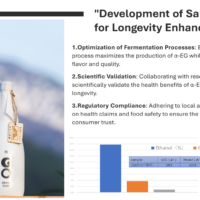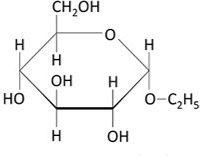Tsunan Sake Brewery Confirms High α-EG Content in ‘GO GRANDCLASS Uonuma Koshihikari Edition’
Tsunan Sake Brewery Co., Ltd. (Head Office: Tsunan Machi, Nakauonuma District, Niigata Prefecture; CEO: Kengo Suzuki, hereinafter “Tsunan Sake Brewery”) has confirmed through an analysis of the pure rice Daiginjo sake “GO GRANDCLASS Uonuma Koshihikari Edition,” brewed using Uonuma-grown Koshihikari rice, that the amount of ethyl-α-D-glucoside (hereinafter “α-EG”) is 0.93g per 100g, as measured by Professor Kenji Ozeki’s laboratory at Kanazawa Institute of Technology.
Background
α-EG, known as a functional compound, is recognized as one of the most abundant components in sake after glucose and ethanol, and is typically found in amounts of 0.6-0.8% in pure rice sake or 0.2-0.3% in Ginjo sake. In an effort to enhance the value of sake through the use of “smart brewing”*, Tsunan Sake Brewery hypothesized that the process of brewing sake from Koshihikari rice could increase the α-EG content. As a result, Professor Kenji Ozeki was tasked with measuring the α-EG content.
* About “smart brewing” : https://tsunan-sake.com/smart-brewing-realized-by-combining-the-research-results-of-generative-ai-and-brewing-microorganisms-began-operation-as-a-sustainable-brewing-system-at-tsunan-sake-brewery/
About α-EG
α-EG is a compound produced by enzymes derived from koji in the presence of ethanol and oligosaccharides. It is known to be abundantly produced during sake brewing, which involves “multiple parallel fermentation,” a process where saccharification and alcohol fermentation occur simultaneously. Numerous studies, including human clinical trials, have reported the functional properties of α-EG.
Future Development
Although research and development exploring the health-promoting effects of sake are being conducted by some companies and research teams, there is still room for broader recognition. Tsunan Sake Brewery intends to continue examining the potential health benefits of components found in sake, such as α-EG, with the goal of raising the global presence of sake and sharing information on its potential contributions to human health.
About Professor Kenji Ozeki’s Laboratory at Kanazawa Institute of Technology
This laboratory challenges SDGs by developing new materials from food waste using the power of beneficial enzymes and fermentation microorganisms. The research focuses on microorganisms such as koji mold and yeast, as well as food waste resources (biomass) like rice bran, wheat bran, and soybean okara. Through the bio-conversion of these materials into new, highly functional substances (α-EG, resistant protein, etc.) using the power of enzymes and fermentation, the lab aims to develop functional materials without producing waste, in line with the SDGs.
https://kitnet.jp/laboratories/labo0165/index.html
About Tsunan Sake Brewery Co., Ltd.
Tsunan Sake Brewery Co., Ltd. is a sake brewery located in Akinari, Tsunan Town, Nakauonuma District, Niigata Prefecture. Known for its heavy snowfall, this region uses natural spring water from 2,000-meter-high mountains for sake production. Utilizing local specialty sake rice “Gohyakumangoku,” the brewery engages in sake brewing in harmony with nature under the brand concept “Brew for Future – Brewing a Coexisting Future.” Since 2023, with a new management structure, the brewery aims to create new value by integrating the brewery with science and expanding overseas.
https://tsunan-sake.com






